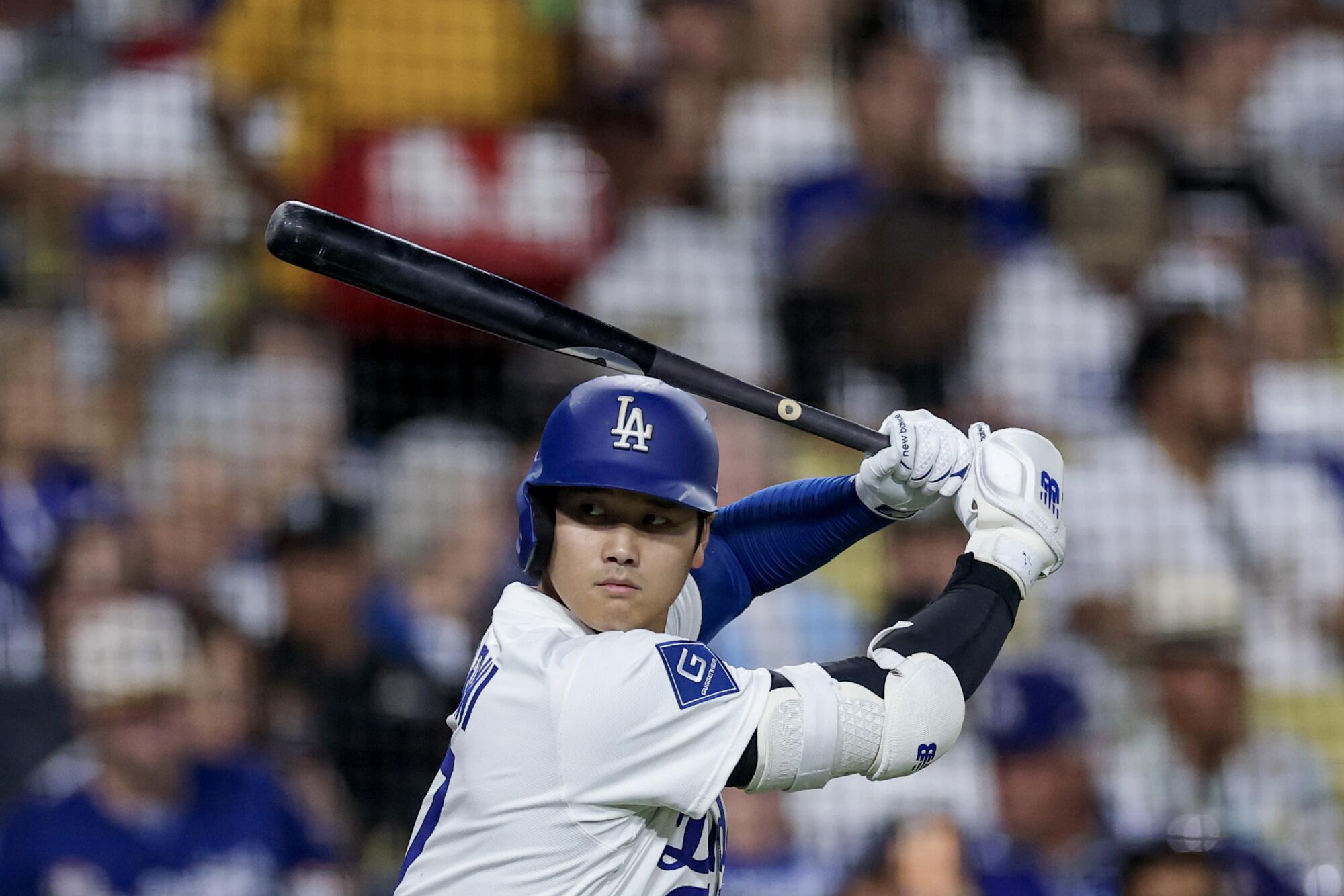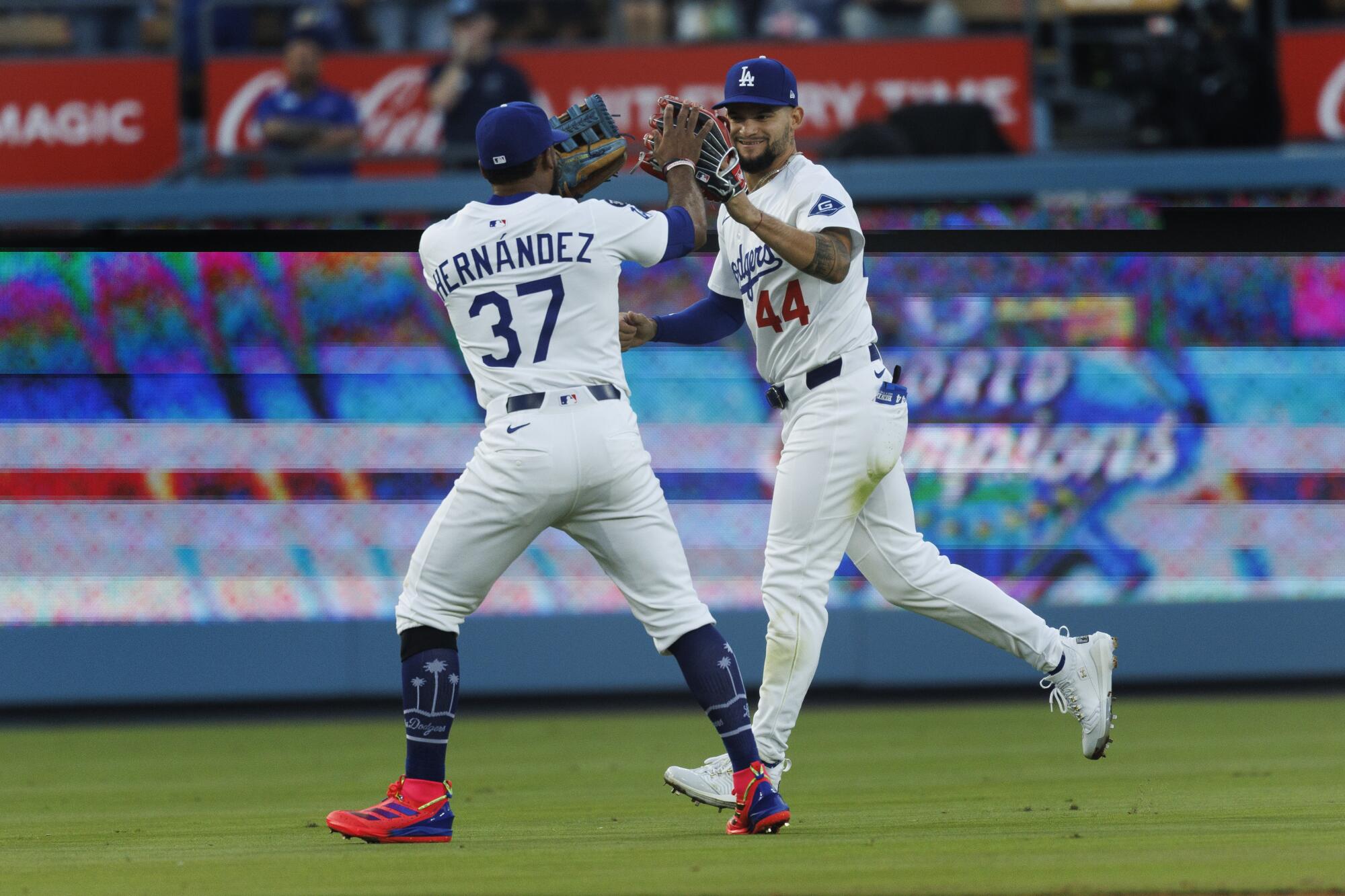Can Dodgers fix offense? It starts with better health, and team at-bats
To Andrew Friedman, something like this was a virtual impossibility.
“If you had said that we would have a six-week stretch where our offense would rank 30th in baseball, I would have said there was a zero percent chance,” the Dodgers president of baseball operations said last month.
“I would have been wrong,” he quickly added.
Over a five-week stretch from July 4 to Aug. 4, the Dodgers inexplicably ranked 30th (out of 30 clubs) in scoring. And though they’ve been slightly better in the five weeks since, questions about their supposed juggernaut lineup still abound.
In the first half of the season, the Dodgers boasted the best offense in the majors, leading the majors in scoring (5.61 runs per game), batting average (.262), OPS (.796) and hitting with runners in scoring position (.300) and went 56-32 over their first 88 games.
Since then, however, everything has flipped.
It started with a July slump that was as stunning as it was unforeseen, with the Dodgers averaging just 3.36 runs in a 25-game stretch commencing with Independence Day. Since then, there have been only marginal improvements, with the Dodgers entering Friday ranked 24th in scoring (4.21 runs per game), 25th in batting average (.237), 18th in OPS (.718) and 22nd in hitting with runners in scoring position (.245) over their last 58 games — a stretch in which they’ve gone 26-32.
“Not scoring runs,” first baseman Freddie Freeman said last week, “it’s just not who we are.”
On the surface, the root causes seemed rather obvious. Much of their lineup was either on the injured list or scuffling in the wake of previous, nagging injuries. Healthy superstars were grinding through flaws with their swings. What little depth they had failed to compensate.
To that end, the team is hopeful it has turned the page.
Shohei Ohtani, after a midseason lull, is back to his MVP-caliber norms. Mookie Betts is back to looking like himself at the end of an otherwise career-worst season. Max Muncy and Tommy Edman have returned from injuries, providing the batting order with much-needed length. Significant playing time is no longer going to the likes of Buddy Kennedy, Alex Freeland, Estuery Ruiz or any of the other anonymous faces that populated the clubhouse during the campaign’s darkest days.
“Our lineup, our team, looks more whole,” manager Dave Roberts said this week. “I think that we’ve all been waiting for our guys to come back to health, and see what we look like as the ballclub that we had all envisioned.”
Still, when asked whether the Dodgers’ second-half slump could just be pinned on personnel issues, Roberts and his players said it wasn’t that simple.
The Dodgers might not have been whole. But they weren’t doing fundamental things — like stressing opposing pitchers, driving up pitch counts, or executing in leverage situations — either.
“We’d lost sight of playing the game the way we’re capable of playing,” Roberts acknowledged.
“For a little while,” Betts added, “we were having just some bad at-bats.”
This is the dynamic the Dodgers have honed in on fixing, hoping to turn their summer-long frustrations into a valuable learning experience as October nears.
In recent days, a renewed and deliberate emphasis has been placed on the importance of competitiveness at the plate. Daily hitters’ meetings have included film sessions reviewing situational at-bats from the previous night. In-game dugout conversations have centered on a more basic message.
“It’s more about your approach, your plan,” Freeman said. “That’s been the focus.”
This week, the team took what it hopes are important first steps, ambushing the Rockies with seven- and nine-run performances in which they advanced baserunners, capitalized on scoring opportunities and built the kind of big innings that been missing over the two months beforehand.
“We said a few games ago, ‘This needs to be like how we focus for the playoffs,’” Freeman said. “Focus on the little things that help win games.”
The Dodgers, of course, have seen what a broken offense looks like before.
And they know what happens when it doesn’t get rectified before the playoffs.
Late in 2022, as co-hitting coach Aaron Bates recalled this week, the team slipped into bad habits while nursing a massive National League West lead: “It felt like that whole month of September was swing camp, or spring training,” he said, “in the sense of guys working on their swings individually too much, as opposed to playing the game in front of them.”
The results then were costly: A four-game NL Division Series elimination to the San Diego Padres in which the Dodgers repeatedly failed with runners in scoring position.
The next year was more of the same: The team losing its identity while coasting down the stretch, before being swept by the Arizona Diamondbacks in three listless games.
Last season, the Dodgers finally avoided such pitfalls. They batted .278 with runners in scoring position during their postseason run to the World Series. Their tying and go-ahead runs in the Fall Classic clincher came on a pair of productive at-bats in the form of sacrifice flies.
The Dodgers’ Shohei Ohtani has showed his MVP form in recent games, homering twice in last Sunday’s win against the Baltimore Orioles.
(Eric Thayer / For The Los Angeles Times)
But this summer, after a first-half outburst that met every lofty expectation of their $400 million roster, more troubling patterns began to resurface again.
Betts’ slow start devolved into a career-worst slump, bottoming out with a .205 average during July. Freeman began to fade right alongside him, with his .374 season average at the end of May plummeting to .292 less than two months later. Edman and Teoscar Hernández struggled after returning from first-half injuries. Michael Conforto never found his footing while Andy Pages endured an extended sophomore slide.
When coupled with Muncy’s prolonged absence — he missed 48 of 56 games because of a knee injury and oblique strain — the Dodgers suddenly had a lineup of players either grinding to rediscover their swing, or struggling to make up for the firepower they were missing.
And as easy scoring dried up, their inability to work consistent “team at-bats” quickly became magnified.
“It happened incrementally, every day, little by little,” Bates said. “Where it’s like, you’re a little off, you want to see what’s wrong with your swing, and you don’t realize that it snowballs. Before you know it, you’re thinking so much about your swing, you’re off of the situations out there.”
It was a problem, Bates insisted, borne of good intentions. Most of the roster was battling swing flaws. Too much daily energy was spent on players trying to individually get their mechanics right.
It led to mindless swings were wasted on bad pitches. It caused scoring opportunities to carelessly, and repeatedly, go frustatingly by the wayside.
“Guys just got so internal with their mechanics,” Bates said, “they weren’t able to shift their focus once the game starts to just competing in the box.”
Bates started sensing the trend while watching the team from afar, gaining a different perspective during a two-week medical absence in early August to address blood clots in his leg.
In the clubhouse, players began voicing similar observations after particularly puzzling offensive performances in recent weeks.
“I feel like a lot of swings that we took today weren’t really good swings to get on base,” veteran infielder Miguel Rojas said after the Dodgers managed only one hit in six innings against Padres left-hander Nestor Cortes on Aug. 23. “We know we’re more than capable of putting up better at-bats and more hits together to create some traffic.”

“We individually are trying to find ways on our own to make sure that we’re just hitting better than we are,” Ohtani echoed, through an interpreter, after the Dodgers’ one-run performance in a series-opener in Baltimore last weekend. “But I think the side effect of that is, we’re a little too eager, and putting too much pressure on ourselves.”
Thus, this week, the team endeavored to make changes.
In their daily pregame hitters’ meetings, the club has started holding what fellow co-hitting coach Robert Van Scoyoc described to SportsNet LA as “NFL-style” film sessions; in which players were asked to review situational at-bats from the night before, and analyze their ability to execute their plan of attack.
“The game rewards you for having those ‘team at-bats,’” Bates said. “So you just preach to them by holding each other accountable, talking about them after the fact, not shying away from it.”
Freeman added that, in the dugout, players have also made an effort to emphasize that message among themselves.
“Don’t get upset because your swing didn’t feel good,” he said. “Like, if you go 0-for-four but move a runner over four times, that’s a great game for us. It might not be for your stats. But you gotta throw that out the window. That’s what we’ve been trying to clean up.”
The hope is that this renewed focus will naturally help hitters sync-up their swings.
On Monday night, for example, Betts moved a runner to third base with a fly ball in the sixth inning, before coming back to the plate and roping a tie-breaking two-run single with two outs in the eighth.
“He said it in the hitter’s meeting [the next day],” Freeman relayed, “how that little positive thing of moving [a runner] over helped him build confidence going into his next at-bat.”
Little moments like that, the Dodgers hope, will help kick-start their offense as they come up on the playoffs. They might not have been able to envision the struggles of the last two months. But now, between better health and improving at-bat quality, they finally see a way to fix their ailing offense.
“Now, we’re at least having good at-bats, getting a walk, extending innings, finding ways to manufacture runs,” Betts said.
“I do think that presently, the guys are engaged,” Roberts added. “Guys are playing as one right now.”


